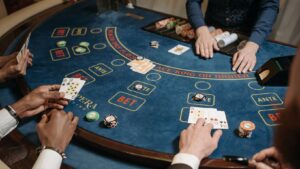Table of Contents
ToggleIn a world where spirituality often feels like a buffet of choices, Christo pagan books serve up a unique blend of faith and folklore, inviting readers to explore the divine with a twist. Imagine combining the wisdom of ancient pagan traditions with the teachings of Christianity—sounds like a recipe for enlightenment, right? These books offer a refreshing perspective that challenges the norm and encourages seekers to embrace a richer spiritual tapestry.
Whether you’re a curious skeptic or a seasoned spiritual traveler, Christo pagan literature might just tickle your fancy. With humor and heart, these works explore the intersection of two seemingly opposing worlds, making the journey both enlightening and entertaining. So grab a cup of herbal tea, settle into your favorite reading nook, and prepare to dive into a realm where ancient rites meet modern faith—who knew spiritual exploration could be this fun?
Overview of Christo Pagan Books
Christo pagan books present a compelling synthesis of pagan beliefs and Christian teachings. These texts encourage exploration of spirituality beyond conventional boundaries. Many authors approach this blend to highlight ancient wisdom intertwined with modern faith practices.
Readers may discover unique rituals and prayers that reflect dual traditions within these works. Various themes include nature reverence paired with the love of Christ, showcasing a harmonious relationship rather than conflict. For example, certain texts incorporate seasonal celebrations, mirroring both Christian holidays and pagan solstices.
The appeal of Christo pagan literature often lies in its inclusivity. Individuals seeking spiritual growth find pathways that honor diverse beliefs. Influential authors like Caitlin Matthews and Philip Carr-Gomm have contributed significantly to this genre, offering insights into integrating practices from both faiths.
Scholarly perspectives emphasize the importance of such texts for understanding contemporary spiritual seekers. Research indicates that many individuals resonate with the idea of a multi-faceted spirituality. This exploration not only enriches personal experiences but also fosters communal connections among practitioners.
Circles of Christo pagans often gather to share interpretations and experiences inspired by these writings. Such gatherings promote dialogue on how to navigate faith journeys while embracing both heritage and modernity. Engaging with Christo pagan texts evokes curiosity, sparking deeper inquiries into the essence of spirituality itself.
Key Themes in Christo Pagan Literature

Christo pagan literature encompasses various themes that resonate deeply with readers exploring spirituality through dual traditions. These themes encourage a rich understanding of faith.
Spirituality and Nature
Nature serves as a fundamental aspect in Christo pagan texts. Writers emphasize reverence for the natural world, viewing it as a sacred expression of the divine. Seasons and cycles often play a crucial role in these writings, aligning with both pagan and Christian observances. Festivals and solstices reflect this harmony, intertwining spiritual celebrations from both traditions. The connection to nature promotes a holistic understanding of existence, enhancing one’s relationship with the divine. Readers find themselves drawn to themes of sustainability and environmental stewardship, fostering a deeper appreciation for the Earth.
Intersection of Christian and Pagan Beliefs
The intersection of Christian and pagan beliefs presents a unique exploration of spirituality. Authors frequently highlight shared values, such as love, compassion, and community. This integration fosters dialogues that bridge gaps between differing faiths. Many texts offer insights into rituals that blend elements from both traditions, encouraging practices rooted in shared humanity. Readers discover how these seemingly opposing beliefs can coexist in a rich tapestry of faith. This synthesis provides opportunities for spiritual growth, enabling individuals to embrace diverse paths while fostering understanding and connection among varied traditions.
Notable Christo Pagan Authors
Christo pagan literature features influential voices that enrich the dialogue between these two traditions. Authors blend elements of paganism and Christianity, inviting readers to explore diverse spiritual landscapes.
Author Profiles
Caitlin Matthews stands out for her contributions, especially through works that emphasize ancient wisdom and modern spirituality. Philip Carr-Gomm, known for his writings on Druidry, integrates Christian themes and practices into his exploration of nature. Other notable authors include Angie Fadke and Michael York, both of whom provide insight into rituals that harmonize both faiths. They enrich the understanding of spiritual practices through personal anecdotes and scholarly perspectives.
Influential Works
Books such as “The Celtic Spirit” by Caitlin Matthews pair pagan beliefs with Christian teachings, showcasing the beauty of these intersecting traditions. Philip Carr-Gomm’s “The Druid Craft” includes elements of both spirituality, highlighting the connection to nature alongside Christian rituals. Angie Fadke’s “Pagan and Christian Together” further explores this duality, focusing on shared values of love and compassion. Michael York’s “Paganism in the Modern World” examines contemporary expressions of faith, providing a comprehensive look at how these traditions intertwine. Each of these works contributes to a richer understanding of Christo pagan spirituality.
Community and Cultural Impact
Christo pagan literature fosters vibrant communities rooted in shared beliefs. Grassroots gatherings enable individuals to explore faith, engaging in discussions that honor both Christian and pagan traditions. These meetings often center around rituals and seasonal celebrations that facilitate connections among participants.
Cultural impact manifests through the blending of spiritual practices. Many readers find resonance in the themes of nature and reverence seen in various texts. Festivals like Samhain and Christmas become platforms for showcasing the harmony of dual traditions, illustrating respect for the Earth alongside Christian devotion.
Authors like Caitlin Matthews and Philip Carr-Gomm play pivotal roles in shaping community responses. Their writings inspire dialogues about spirituality’s multifaceted nature. Engaging with works like “The Celtic Spirit” and “The Druid Craft” provides insights that integrate diverse rituals and practices.
Outreach initiatives often spring from these communities, promoting understanding between differing faiths. Various workshops and events invite broader audiences, highlighting the importance of learning from one another. Participants experience spiritual growth by exploring new perspectives on shared values such as love and compassion.
Peer-led discussion groups frequently emerge, where individuals share personal journeys influenced by Christo pagan texts. These platforms cultivate a deeper appreciation for spiritual connections, emphasizing collective experiences and mutual respect. As curiosity about spirituality increases, communities thrive through collective exploration and discovery.
Christo pagan books offer a rich tapestry of spiritual exploration that blends ancient wisdom with contemporary faith practices. They invite readers to engage with a unique perspective on spirituality that honors both Christian and pagan traditions. By fostering dialogue and community among diverse beliefs, these texts encourage individuals to embrace a multifaceted approach to their faith journeys.
The integration of nature reverence and seasonal celebrations highlights the shared values that resonate deeply within these teachings. As curiosity about spirituality continues to grow, Christo pagan literature serves as a vital resource for those seeking to connect with their heritage while exploring new dimensions of belief. Through this exploration, readers can find inspiration and a sense of belonging in a world that values inclusivity and understanding.




